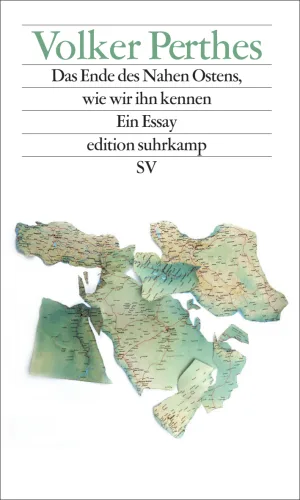The Multipolarisation of the World / Die Multipolarisierung der Welt
A Geopolitical Roadmap
An internationally renowned expert maps out our geopolitically fragmented present
Selected for New Books in German – translation funding guaranteed for the English language
The largely peaceful or at least predictable world order of the long decade of the 1990s is now a thing of the past: neither international organisations nor the USA as erstwhile sole superpower are able to suppress military conflicts like the one in Ukraine. The West seems divided. New powers are entering the arena, and trade wars are posing major problems for export-oriented countries like Germany.
In this essay, Volker Perthes – a former UN diplomat and long-serving director of the...
In this essay, Volker Perthes – a former UN diplomat and long-serving director of the...
Read more
The largely peaceful or at least predictable world order of the long decade of the 1990s is now a thing of the past: neither international organisations nor the USA as erstwhile sole superpower are able to suppress military conflicts like the one in Ukraine. The West seems divided. New powers are entering the arena, and trade wars are posing major problems for export-oriented countries like Germany.
In this essay, Volker Perthes – a former UN diplomat and long-serving director of the German Institute for International and Security Affairs – offers an assessment and overview of this situation. Perthes argues that we are living in an age marked by multipolarisation. In the wake of the Cold War and the Pax Americana, today, five strong poles dominate global politics – with the EU, Russia, and India joining the USA and China. Drawing on examples from the Middle East and Southeast Asia, Perthes shows how mid-sized regional powers are able to play these big actors off against one another, allowing them to exert a strong influence on their immediate neighbours. In light of this, the EU needs to strengthen its ability to act if it wants to avoid being pulled between other poles.
In this essay, Volker Perthes – a former UN diplomat and long-serving director of the German Institute for International and Security Affairs – offers an assessment and overview of this situation. Perthes argues that we are living in an age marked by multipolarisation. In the wake of the Cold War and the Pax Americana, today, five strong poles dominate global politics – with the EU, Russia, and India joining the USA and China. Drawing on examples from the Middle East and Southeast Asia, Perthes shows how mid-sized regional powers are able to play these big actors off against one another, allowing them to exert a strong influence on their immediate neighbours. In light of this, the EU needs to strengthen its ability to act if it wants to avoid being pulled between other poles.
»This essay sharpens our perspective without making unrealistic promises.« Stefan Messingschlager, Süddeutsche Zeitung
»This essay sharpens our perspective without making unrealistic promises.« Stefan Messingschlager, Süddeutsche Zeitung
2026, 351 pages
Persons
Volker Perthes
Author
Volker Perthes, born in 1958, is the director of the German Institute for International and Security Affairs and is considered one of the most internationally renowned experts on the Middle East.
Volker Perthes
Author
Volker Perthes, born in 1958, is the director of the German Institute for International and Security Affairs and is considered one of the most...
© Jürgen Bauer
OTHER PUBLICATIONS
Latest first

Year of Publication: 2015
Volker PerthesYear of Publication: 2015
The End of the Middle East As We Know It
In many ways, the area between the Mediterranean and the Persian Gulf has ceased to be the »Middle East we know« – or believed to know. We cannot foresee future developments in the area, but...
Rights sold to:
Denmark (Ellekaer)
